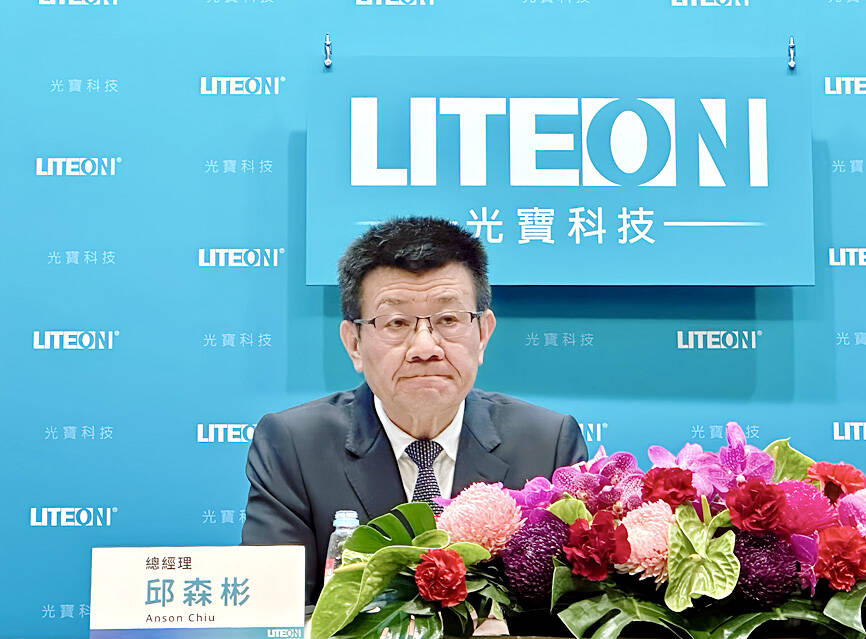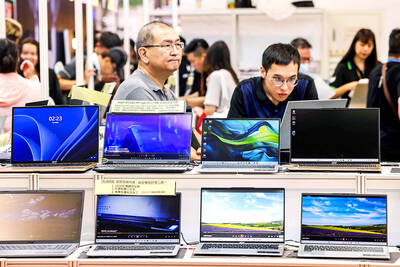Electronic components supplier Lite-On Technology Corp (光寶科技) yesterday reported its lowest profit in four quarters as it announced a strategic investment in Japanese power supply manufacturer Cosel Co.
Lite-On’s net profit for the first quarter of the year fell 30.98 percent to NT$2.39 billion (NT$73.44 million) from NT$3.46 billion the previous quarter, affected by lower sales and continued investment in research and development.
On an annual basis, net profit rose 1.49 percent from NT$2.35 billion, Lite-On said in an earnings report.

Photo: Fang Wei-chieh, Taipei Times
First-quarter sales decreased 22.04 percent from a quarter earlier and 15.8 percent annually to NT$28.78 billion, the company said.
Information technology products and consumer electronics segment made up 42 percent of Lite-On’s sales last quarter, ahead of cloud computing and artificial intelligence (AI) of things segment at 35 percent and optoelectronics segment at 23 percent, it said.
Gross margin and operating margin fell to 20.3 percent and 7.8 percent, from 22 percent and 9.3 percent in the previous quarter, respectively, although they each improved from 18.8 percent and 6.3 percent a year earlier.
Lite-On posted earnings per share (EPS) of NT$1.04 in the first quarter, down from NT$1.51 the previous quarter, but higher than NT$1.03 a year earlier, it said.
SinoPac Securities Investment Service Corp (永豐投顧) had expected the company to post first-quarter sales of NT$32.89 billion, with net profit of NT$3.01 billion, or EPS of NT$1.28.
Lite-On said the operating expenses for investing in research and development accounted for 6 percent of its first-quarter revenue, with a continued focus on cloud, optoelectronics, 5G and new business investments.
This quarter, Lite-On’s sales would increase from last quarter, driven mainly by growth momentum from high-value core businesses — including cloud computing power management, opto semiconductors, advanced power supplies for information technology applications and smart input devices — while shipments from its three major business segments are expected to gradually recover, it said.
The company said that efficient power management systems and thermal management technologies are its major competitive advantages, especially in the face of energy consumption challenges for AI servers.
“AI is revolutionizing our world. This transformation isn’t just about software innovation, but also hinges on the construction of efficient infrastructure,” Lite-On president Anson Chiu (邱森彬) said in the report.
“AI servers consume significantly more energy than traditional servers, making a comprehensive power management system and advanced thermal management technology crucial. These are areas where Lite-On has built significant competitive advantages over time,” he said.
In addition, the company said it had achieved significant progress in high-wattage power systems and liquid cooling solutions in response to the high computing power and high energy consumption requirements of next-generation AI servers.
Contributions from AI server power solutions are expected to account for 12 to 15 percent of the revenue of the cloud computing and AIoT segment this year, a significant increase from 7 to 8 percent last year, the Taipei-based company said.
Lite-On said it expects business to resume growth from the second quarter, and that it is confident of achieving double-digit percentage growth in annual sales for the next three years, starting this year.
It also said it is to acquire a 19.99 percent stake in Cosel at a cost of NT$2.53 billion, which would give Lite-On the right to nominate one board member and suggest one independent board director for the Japanese firm.
This strategic investment in Cosel is expected to create synergy between areas such as product development and manufacturing, as well as geographic footprint and market expansion, providing more comprehensive power solutions for customers, Lite-On said.

TECH TITAN: Pandemic-era demand for semiconductors turbocharged the nation’s GDP per capita to surpass South Korea’s, but it still remains half that of Singapore Taiwan is set to surpass South Korea this year in terms of wealth for the first time in more than two decades, marking a shift in Asia’s economic ranks made possible by the ascent of Taiwan Semiconductor Manufacturing Co (TSMC, 台積電). According to the latest forecasts released on Thursday by the central bank, Taiwan’s GDP is expected to expand 4.55 percent this year, a further upward revision from the 4.45 percent estimate made by the statistics bureau last month. The growth trajectory puts Taiwan on track to exceed South Korea’s GDP per capita — a key measure of living standards — a

READY TO HELP: Should TSMC require assistance, the government would fully cooperate in helping to speed up the establishment of the Chiayi plant, an official said Taiwan Semiconductor Manufacturing Co (TSMC, 台積電) yesterday said its investment plans in Taiwan are “unchanged” amid speculation that the chipmaker might have suspended construction work on its second chip packaging plant in Chiayi County and plans to move equipment arranged for the plant to the US. The Chinese-language Economic Daily News reported earlier yesterday that TSMC had halted the construction of the chip packaging plant, which was scheduled to be completed next year and begin mass production in 2028. TSMC did not directly address whether construction of the plant had halted, but said its investment plans in Taiwan remain “unchanged.” The chipmaker started

MORTGAGE WORRIES: About 34% of respondents to a survey said they would approach multiple lenders to pay for a home, while 29.2% said they would ask family for help New housing projects in Taiwan’s six special municipalities, as well as Hsinchu city and county, are projected to total NT$710.65 billion (US$23.61 billion) in the upcoming fall sales season, a record 30 percent decrease from a year earlier, as tighter mortgage rules prompt developers to pull back, property listing platform 591.com (591新建案) said yesterday. The number of projects has also fallen to 312, a more than 20 percent decrease year-on-year, underscoring weakening sentiment and momentum amid lingering policy and financing headwinds. New Taipei City and Taoyuan bucked the downturn in project value, while Taipei, Hsinchu city and county, Taichung, Tainan and Kaohsiung

Micro-Star International Co (MSI, 微星科技) is expanding notebook computer production in India after partnering with Indian electronics maker Syrma SGS Technology Ltd late last year, as the Taiwanese company seeks to tap into the local market. MSI also plans to manufacture some of its new gaming PCs powered by Nvidia Corp’s RTX 50 graphics cards in India, while adding more advanced and design-focused PCs and notebooks at Syrma’s plant in Chennai, a source told the Taipei Times yesterday on condition of anonymity. MSI’s deployment in India is driven not only by cost advantages, but also by India’s rapidly expanding consumer market and